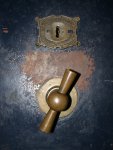

STOLEN MUSIC
Music (not) for two viols and harpsichord
"Borrowed" from Bach, Blavet, and Bartók
Music (not) for two viols and harpsichord
"Borrowed" from Bach, Blavet, and Bartók
Empire Viols
"Excellent" — The Wall Street Journal
"Excellent" — The Wall Street Journal
The concert
Hear unheard-of transcriptions lifted from literature originally claimed by flutes, voices, keyboards, and
oboes. Composers wearing freshly fretted garb include Handel, Blavet, and two Bachs: JS and WF.
Featured are "NotASonata" by Handel, an innovative recombination of movements that "should have
been" written for viols, including the poignant duo "Who Calls My Soul from Death?" from the oratorio
"Esther," and a duo originally for flutes by W. F. Bach, Johann Sebastian's brilliant if erratic elder son.
The program
Johann Sebastian Bach (1685-1750)
Two-Part Inventions (c. 1720, for keyboard)
C-major, BWV 772
D-minor, BWV 775
F-major, BWV 779
Ennemond Gaultier "le vieux" (1575-1651)
Pièces de luth (c. 1620, for lute)
Allemande La Vestemponade
Courante La Superbe
Sarabande de Mézangeau
Chaconne
Michel Blavet (1700-1768)
Duo arrangements (c. 1745, for flutes)
La Rose (Jean-Philippe Rameau)
Les Ondes (François Couperin)
Tambourins (Rameau)
Louis-Nicolas Clérambault (1676-1749)
Sonata La Magnifique (c. 1710, for flutes)
[Entrée – Grave]
Allegro
Adagio
Sarabande – Gigue
Allegro
Wilhelm Friedemann Bach (1710-1784)
Duet in F major, F 57 (c. 1740, for flutes)
Allegro e moderato
Lamentabile
Presto
Béla Bartók (1881-1945)
Five pieces from Violin Duos (1931) and For Children (1908, for piano)
Rose Garden
White Lilies
Rondino
Song of the Vagabond
Pillow Dance
George Frideric Handel (1685-1759)
Not a Sonata (c. 1708, for oboes)
Adagio (HWV 383)
Allegro - Largo (HWV 380)
Adagio e staccato (from "Esther," 1732)
Allegro (HWV 383)
Hear unheard-of transcriptions lifted from literature originally claimed by flutes, voices, keyboards, and
oboes. Composers wearing freshly fretted garb include Handel, Blavet, and two Bachs: JS and WF.
Featured are "NotASonata" by Handel, an innovative recombination of movements that "should have
been" written for viols, including the poignant duo "Who Calls My Soul from Death?" from the oratorio
"Esther," and a duo originally for flutes by W. F. Bach, Johann Sebastian's brilliant if erratic elder son.
The program
Johann Sebastian Bach (1685-1750)
Two-Part Inventions (c. 1720, for keyboard)
C-major, BWV 772
D-minor, BWV 775
F-major, BWV 779
Ennemond Gaultier "le vieux" (1575-1651)
Pièces de luth (c. 1620, for lute)
Allemande La Vestemponade
Courante La Superbe
Sarabande de Mézangeau
Chaconne
Michel Blavet (1700-1768)
Duo arrangements (c. 1745, for flutes)
La Rose (Jean-Philippe Rameau)
Les Ondes (François Couperin)
Tambourins (Rameau)
Louis-Nicolas Clérambault (1676-1749)
Sonata La Magnifique (c. 1710, for flutes)
[Entrée – Grave]
Allegro
Adagio
Sarabande – Gigue
Allegro
Wilhelm Friedemann Bach (1710-1784)
Duet in F major, F 57 (c. 1740, for flutes)
Allegro e moderato
Lamentabile
Presto
Béla Bartók (1881-1945)
Five pieces from Violin Duos (1931) and For Children (1908, for piano)
Rose Garden
White Lilies
Rondino
Song of the Vagabond
Pillow Dance
George Frideric Handel (1685-1759)
Not a Sonata (c. 1708, for oboes)
Adagio (HWV 383)
Allegro - Largo (HWV 380)
Adagio e staccato (from "Esther," 1732)
Allegro (HWV 383)